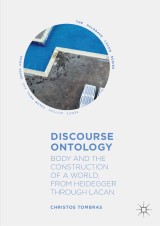Details

Discourse Ontology
Body and the Construction of a World, from Heidegger through LacanThe Palgrave Lacan Series
|
96,29 € |
|
| Verlag: | Palgrave Macmillan |
| Format: | |
| Veröffentl.: | 23.03.2019 |
| ISBN/EAN: | 9783030136628 |
| Sprache: | englisch |
Dieses eBook enthält ein Wasserzeichen.
Beschreibungen
<div>This book explores the themes within, and limits of, a dialogue between Martin Heidegger’s philosophy of being and Jacques Lacan’s post-Freudian metapsychology. It argues that a conceptual bridging between the two is possible, and lays the foundations of that bridge, starting with Heidegger and proceeding through the work of Lacan. After presenting basic aspects of Heidegger’s ontology, Tombras focuses on his incisive critique of modern science and psychoanalysis, and argues that psychoanalytic theory is vulnerable to this critique. The response comes from Lacan’s re-reading and recasting of fundamental Freudian insights, and his robust post-Freudian metapsychology. A broad discussion of Lacan’s work follows, to reveal its rupture with traditional philosophy, and show how it builds on and then reaches beyond Heidegger’s critique. </div><div><br></div><div>This book is informed by the terminology, insights, concepts, hypotheses, and conclusions of both thinkers. It discusses time and the body in jouissance; the emergence of the divided subject and signifierness; truth, agency and the event; and being and mathematical formalisation. Tombras describes the ontological recursive construction of a shared ontic world and discusses the limits and historicity of this world.</div><div><br></div><div><br></div>
<p>Chapter 1: Introduction.- Chapter 2: Heidegger’s question of being.- Chapter 3: A critique of science and psychoanalysis.- Chapter 4: Back to Freud, and beyond.- Chapter 5: Lacanian metapsychology.- Chapter 6: An Ontology from Discourse.- Chapter 7: Conclusion: Psychoanalysis as a cause.</p>
<p>Christos Tombras is a supervising psychoanalyst with a Lacanian orientation, practicing in London, UK. Dr. Tombras is a member of the Centre for Freudian Analysis and Research, UK, and lectures, runs workshops and facilitates reading groups. His main research interest is in a dialogue between continental philosophy and psychoanalysis. He has published in both English and Greek.<br></p>
<div><p>This book explores the themes within, and limits of, a dialogue between Martin Heidegger’s philosophy of being and Jacques Lacan’s post-Freudian metapsychology. It argues that a conceptual bridging between the two is possible, and lays the foundations of that bridge, starting with Heidegger and proceeding through the work of Lacan. After presenting an overview of key concepts of Heidegger’s ontology, Tombras sets out an incisive critique of modern science and psychoanalysis, and argues that psychoanalytic theory is vulnerable to this critique. The response comes from Lacan’s re-reading and recasting of fundamental Freudian insights, and his robust post-Freudian metapsychology. A broad discussion of Lacan’s work follows, which reveals its rupture with traditional philosophy, and demonstrates how it builds on and then reaches beyond Heidegger’s critique. </p>
<p>This book is informed by the terminology, insights, concepts, hypotheses, and conclusions of both Heidegger and Lacan.It discusses time and the body in jouissance; the emergence of the divided subject and signifierness; truth, agency and the event; and being and mathematical formalisation. Crucially, Tombras describes the ontological recursive construction of a shared ontic world and discusses the limits and historicity of this world. This book opens up new pathways in the study of ontology and epistemology and will appeal in particular to students and scholars of psychoanalysis and philosophy. </p>
<p>Christos Tombras is a supervising psychoanalyst with a Lacanian orientation, practicing in London, UK. Dr. Tombras is a member of the Centre for Freudian Analysis and Research, UK, and lectures, runs workshops and facilitates reading groups. His main research interest is in a dialogue between continental philosophy and psychoanalysis. He has published in both English and Greek.</p></div><div><br></div>
<p>This book is informed by the terminology, insights, concepts, hypotheses, and conclusions of both Heidegger and Lacan.It discusses time and the body in jouissance; the emergence of the divided subject and signifierness; truth, agency and the event; and being and mathematical formalisation. Crucially, Tombras describes the ontological recursive construction of a shared ontic world and discusses the limits and historicity of this world. This book opens up new pathways in the study of ontology and epistemology and will appeal in particular to students and scholars of psychoanalysis and philosophy. </p>
<p>Christos Tombras is a supervising psychoanalyst with a Lacanian orientation, practicing in London, UK. Dr. Tombras is a member of the Centre for Freudian Analysis and Research, UK, and lectures, runs workshops and facilitates reading groups. His main research interest is in a dialogue between continental philosophy and psychoanalysis. He has published in both English and Greek.</p></div><div><br></div>
Opens up a dialogue between Martin Heidegger’s philosophy of being and Jacques Lacan’s post-Freudian metapsychology Reveals Lacan's rupture with traditional philosophy and how it builds on Heidegger's critique Describes the ontological recursive construction of a shared ontic world
“<i>Discourse Ontology</i> is an original, highly learned and dazzling work of scholarship, that will be an invaluable reference for those seeking an overview of Lacanian and Heideggerian thinking and how the two relate and differ, whilst offering a new perspective through an original synthesis that will reward future reflection and consideration. As such, it is highly recommended and I hope it finds a wide audience, sparking a renewed debate about, and curiosity in, the foundations of psychoanalytic thought and what this might mean for psychoanalytic practice.” (Barry Watt, British Journal of Psychotherapy 37, 1)<p>“Alongside this effort to construct a clear and coherent thesis Tombras equally acknowledges various points of discordance between Heidegger and Lacan, yet attempts a reconciliation through reference to Heidegger’s notion of a 'circle of understanding', as a means of generating a coherent synthesis that serves to usher in the galvanising notion of a discourse ontology. ...The scope and range of this book is impressive and goes far to set out the main precepts for a serious dialogue between these seminal figures. I am sure this book will stand the test of time.” (Gwion Jones JCFAR 30)</p>

















